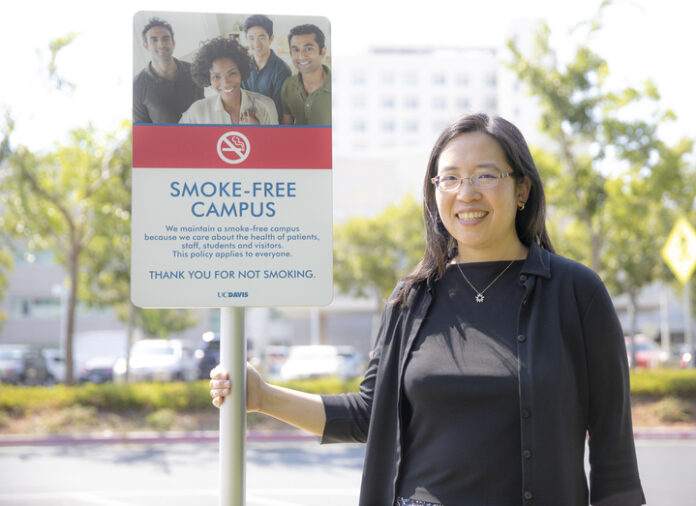A new study confirms that Tobacco Tracker, a convenient crowdsourcing tool, effectively reduces tobacco use and increases awareness on the campus
By MONICA MANMADKAR — science@theaggie.org
A new study published in the Oxford Press Journal inspects the effectiveness of a unique online tool used to cultivate a healthier, smoke-free and tobacco-free campus.
Co-authored by Dr. Elisa Tong, a tobacco researcher at the UC Davis Comprehensive Cancer Center, the study looks into the impacts of the Tobacco Tracker. Tong first became interested in the effects of tobacco as a medical student. Tong said that while she was looking for other ways to help and increase awareness, she pioneered the idea of the Tobacco Tracker, which stemmed from UC Davis’ Thermoostat.
“Since the campus community has contacted our Smoke & Tobacco-Free Policy committees about tobacco use or litter on campus, we wanted to create something similar to Thermoostat where we could crowdsource and visualize information,” Tong said.
There are three ways to access the Tobacco Tracker: through the squirrel icon tile on myucdavis.edu, through breathefree.ucdavis.edu and through the UC Davis app. Once you are on the tool, you can input a submission by noting where you were and what you noticed.
“We strayed away from the word ‘report,’” said Keavagh Clift, the staff lead for the Smoke & Tobacco-Free policy who also contributed to the study. “Through some of the focus groups that we did, [we noticed] students were turned off by that because they felt that they were telling on someone, instead tell us what you noticed.”
In addition to having students report areas where they saw smoking, vaping, litter or any other sign of tobacco use, Clift said that their team also wants to promote clean areas and encourage contributors to notice areas that were particularly clean.
The tool also helps the team understand where the hotspots are and where to install signage such as posters. By putting up signage near these hotspots, the committee can remind users of the Smoke & Tobacco-free policy.
Through the study, the researchers were able to analyze the results of a campus wide survey before and after the introduction of the Tobacco Tracker. After over 1,000 submissions, Tong reported that they discovered that people’s awareness of smoke and tobacco use increased as well as the use of the tool. People became more inclined to aid in keeping the campus smoke and tobacco-free.
According to the study, among the submissions, the main reasons to complete the survey were not only health concerns, environmental concerns and policy enforcement. In addition to keeping the campus healthy, the study showed that more people are involved because of the negative environmental impacts of smoking and using tobacco. 79% of the 1,163 Tracker submissions were motivated to promote a cleaner environment, especially after participants learned more about tobacco waste’s impact on the environment.
“Cigarette butts are the No. 1 litter problem that leach a lot of toxic chemicals, plus the filters are plastic and not biodegradable,” Tong said. “E-cigarettes and vape devices have a lot of waste and toxic chemicals too, including heavy metals and lithium from the batteries and heating coils. I think we’re finding that there is a lot more awareness and concern about the environment in general and people want to do something to help.”
The tool is focused on education and awareness, not enforcement, Clift stated. She continued that they do not want to force anyone to quit but rather encourage them to comply with the Smoke & Tobacco-Free policy and put forward resources for whoever wants to quit. According to Tong, among students, less than 10% used tobacco in the past three months, and many want to quit. There are many resources available at Student Health, including one-on-one counseling and nicotine replacement therapy, Clift specifies.
Tong and Clift hope to expand the tool to the rest of the UC and CSU campuses, which all have a smoke-free and tobacco-free policy. Waiting for funding, Tong and the team have submitted a research grant proposal for a follow-up study. Moreover, they hope that the Tobacco Tracker will be a cornerstone of more extensive and comprehensive Healthy UC Davis and Sustainability activities to support the campus.
Written by: Monica Manmadkar — science@theaggie.org




